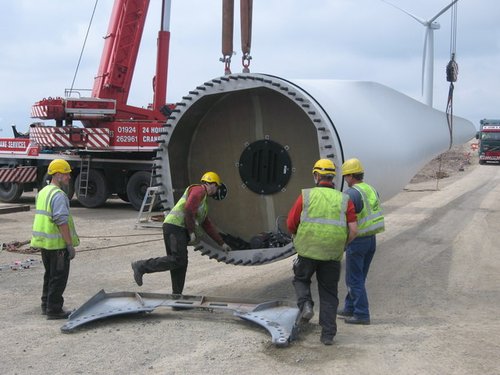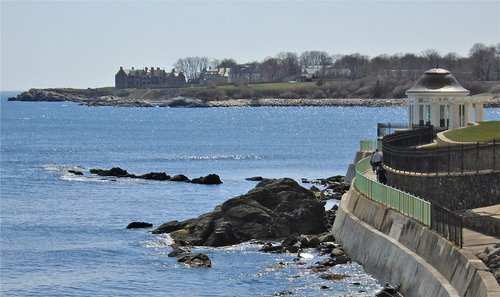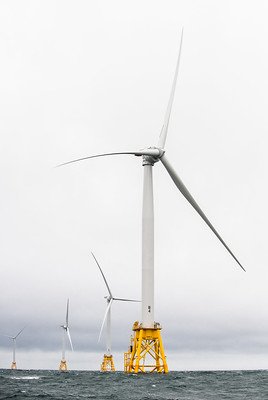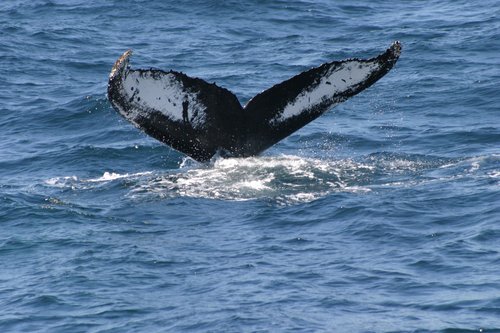Salve Regina Student Research Findings on Offshore Wind Energy in Rhode Island
The students of Salve Regina University's Environmental Justice 334 spent the Spring 2024 semester researching the controversies surrounding the development of windfarms off the coast of Rhode Island. Students first researched issues covered in local news sources and identified five major themes: employment, tourism, energy, legal issues, and wildlife. Each group then identified claims made by different factions in their theme and investigated the claims' relative validity. See summaries below and click to read their final reports. (Image credit for above photo: Dennis Schroeder, National Renewable Energy Lab)
Employment and Industry Implications of the Offshore Wind Projects in Rhode Island

Offshore wind farms will have beneficial long-term effects on Rhode Island's industry and employment. While locals have expressed mixed opinions about the wind farm projects, fishermen have been the most concerned. Many of their fears are not founded in the reality of offshore wind farms. Impacts on the fishing industry could be slightly negative during construction with disruption from the pipeline (Becker 2024). After implementation, they should increase biodiversity with the artificial reef effect (Gill et al. 2020; Perry and Heyman 2020; Van Hoey et al. 2021). In the long-term, the fossil fuel industry has and will be more harmful to the fisheries (IPCC 2022). Despite misinformation from the natural gas industry, workers' skills and methods can be transferred to the wind energy (Almegaard 2023, Hattam et al. 2015). In addition, there will be positive long-term economic impacts as employment opportunities grow. Unfortunately, no evidence suggests that plans for diversifying the domestic workforce promote equitable job creation in the local community. Studies into established wind farm projects are needed to understand how they affect Rhode Island industries and employment. It is critical to reference other successful offshore wind farm projects to replicate methods that benefit all areas of the economy. This research suggests that offshore wind farms will positively affect job creation and fisheries in Rhode Island. Still, attention should be paid to equitable hiring practices during future projects to ensure environmental justice. (Photo credit: Paul Anderson, Wikimedia Commons)
View report:
ENV334Employment and Industry Implications of the Offshore Wind Project
Offshore Wind Farm in Rhode Island: Tourism Impacts

After examining past locations around the world that have implemented offshore wind power, nearly every case posed little to no negative impact on tourism and recreation. For instance, construction of offshore wind turbines in Block Island, RI in 2016 sparked a new culture of recreational activities for travelers and locals alike. In Rhode Island, the impact of offshore wind on tourism has sparked a contentious debate involving economic disparities, scenic concerns, and potential drawbacks for tourism, highlighted by contrasting views in research and media. Rudgard emphasizes the revenue potential for local tourism from offshore wind turbines (p 8), whereas opposition cites a survey showing that over half of renters would decline to rent again at a reduced rate if wind turbines were offshore, even if not visible (Sanders, p 7). The Preservation Society of Newport County appeals against the US Department of the Interior and Bureau of Ocean Energy Management (BOEM), alleging failure to comply with NEPA and NHPA in authorizing Revolution Wind Farm and Southfork Wind Farm projects, citing severe adverse viewshed effects on the integrity of historic resources and potential impacts on Newport's heritage-tourism economy. In an extensive review of the area of potential effect the BOEM found minimal visual impacts from the coast of Newport based on visual simulations. While the visual impacts will alter the historic setting of NRHP and NHL’s, the historic integrity of such places are dependent on more criteria besides their maritime setting.The emphasis on historical preservation and oceanic views in Newport, RI fosters strong place-based identities, raising questions about maintaining tradition in a modernizing world. To assess potential impacts on tourism in Newport offshore wind farms, international studies reveals turbines generally have little to no negative effect on tourism rates; indeed, they can act as attractions, as seen in Portugal, Iceland, France, and the Dutch Coast, suggesting that embracing this technology could benefit Newport's tourism industry similarly to European experiences. Offshore wind farms like those in Rhode Island, such as the Block Island Wind Farm, have become major tourist attractions due to their impressive engineering, unique coastal setting, and contributions to the local economy, offering educational experiences and recreational fishing opportunities that appeal to a broad range of visitors, thus enhancing tourism in these areas significantly. (Photo credit: Beyond My Ken, Wikimedia Commons)
View report:
Energy Claims for the Wind Farm off Newport’s South Coast

Overall, wind energy is a better energy choice when compared to non-renewable options and in terms of emissions, costs and savings, and health impacts. Non-renewable sources such as oil and coal pollute the air and water while also creating a greenhouse effect, harming all life forms, and negatively impacting the global climate (Freeman, 2022). While the production and installation of wind turbines does release pollutants, the turbines ultimately offset the entirety of their lifecycle emissions rather quickly (yaleclimateconnection.org). In terms of cost, wind farms are significantly more cost-efficient than non-renewable resources. Lastly, there is not enough solid evidence to conclude that wind turbines cause significant health effects, unlike the serious impacts resulting from fossil fuel exposure such as respiratory illness and cancer (Susanto 2020, p. 8). The benefits of wind energy outweigh the costs and could hold the answer to a greener future. (Photo credit: Dennis Schroeder, National Renewable Energy Lab)
View report:
A Legal Whirlwind: An Exploration and Evaluation of Legal Claims Relating to the South Fork Wind Farm and Revolution Wind Project
The numerous permitting and legal violations filed against the Wind Farm Project and its facilitators cannot be legitimized, however, such concerns highlight the necessity for a streamlined and unified legal process for wind turbine implementation. With the Biden Administration’s national goal of net-zero emission by 2050 (White House 2023) and Rhode Island’s state goal of carbon-neutrality by 2035 (Raimondo 2020), progressive steps towards renewable energy are critical in meeting these goals. As these deadlines are rapidly approaching, the issues called into question by numerous public and private organizations mainly concern the adherence of the project to local, state, and national laws. Through extensive research, many of these claims are proven to be greatly misguided. The wind farm permitting process is a lengthy, multi-layered procedure that has taken nearly twelve years to complete (Baker 2023). Broadly, most projects require approval from local, state, interstate, and federal authorities. Rhode Island was granted an area of 1,547 square miles of water (1,168 square nautical miles) through the e Ocean Special Act Management Plan (SAMP). Beyond state waters, the SAMP will be developed with federal agencies that have jurisdiction in federal waters – illegalizing any state and local claims over such open oceans (RI CRMC, n.d.). Additionally, the Preservation Society of Newport County is appealing to the Bureau of Ocean Management (BOEM) in its efforts to slow down the wind farm project (Preservation Society of Newport County v. US 2023). In violation of section 106 of the National Historic Preservation Act (NHPA), the Preservation Society has claimed that proper mitigation did not occur. In a similar fashion, Section 110(f) of the same law was put into question for its consultation and guideline “noncompliance.” The validity of these NHPA violations proved legally unverifiable. Despite the many unsupported claims, this skepticism emphasizes key issues regarding the transparency of the permitting process. Through Rhode Island Senator Shelton Whitehouse’s proposed COLLABORATE Act, there is hope for future offshore wind farm projects (Whitehouse 2024). This stands for Create Offshore Leadership and Livelihood Alignment by Operating Responsibly and Together for the Environment. If passed, this provision will establish a national offshore wind director whose duty would consist of streamlining the existing legal processes and preventing destructive misinformation and miscommunications amongst public, private, and governmental agencies.
View report:
The Relationship Between Offshore Wind Farms and Marine Wildlife in Rhode Island

Despite political and environmental controversy, research has shown that not only do offshore wind farms have minimal impact on birds, whales, and benthic organisms, but can actually be beneficial to marine ecosystems. However, many Rhode Island and Massachusetts citizens are concerned that the construction of the Revolution wind turbines will displace, injure, or even kill marine life such as whales, sea birds, and benthos, decreasing the biodiversity of marine ecosystems. More specifically, many claim that the installation of offshore wind farms will interfere with the migration paths of the endangered North Atlantic right whale, and the osprey, a raptor protected under the Migratory Bird Treaty Act, through physical obstruction, light pollution, and noise pollution (NOAA, 2023). Additionally, benthic communities are of equal concern when it comes to wind farm construction. The term “benthic” or “benthos” refers to organisms that live on the sea floor, like barnacles, mussels, crustaceans, corals, sea stars and sea urchins (Horwath et al., 2021). Benthic communities are thought to be crushed or smothered during the anchoring of the base of offshore wind turbines. However, current research refutes these claims on the negative impacts of offshore wind farms, stating that their construction benefits benthic communities, has little to no impact on the health of whales, and only temporarily impacts migrating bird species. New and innovative technology has found ways to decrease the negative impact of wind farms on whales, birds, and benthic organisms, as scientists are finding ways to make the turbines safer and less disruptive to these animals and their environment. (Image credit: National Oceanic and Atmospheric Administration Digital Library)
View report:
ENV334: The Relationship Between Offshore Wind Farms and Marine Wildlife in Rhode Island
